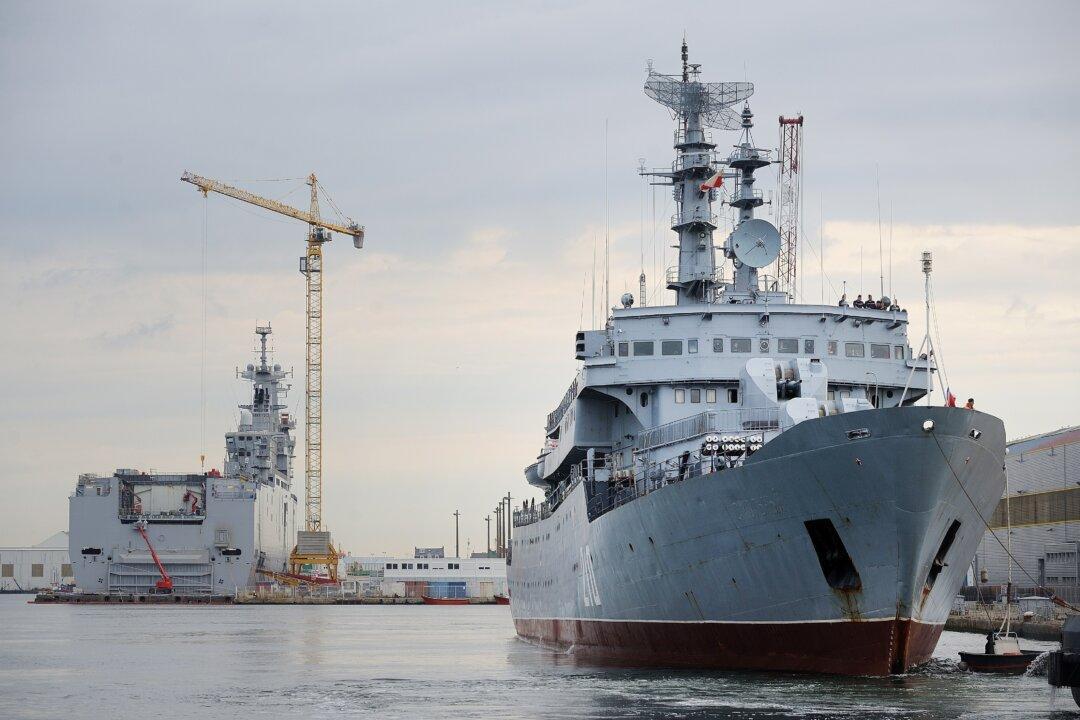“The agreement was signed in 2011, the boat is almost finished and must be delivered in October … The Russians have paid. We would need to pay back 1,1 billion euros,” French President François Hollande explained during a dinner hosted by the Presidential Press Association on July 21.
After the crash of flight MH17 above the region of pro-Russian separatists in the east of Ukraine, tensions with Russia have gained new heights. Still, Paris wants to maintain its trading contract with Moscow concerning two Mistral helicopter-carrying ships.
Built in the shipyard of Saint-Nazaire in France, these impressive ships represent important income for France as well as a source of employment. 400 Russian marines have already been on site since June 30 to familiarize themselves with operating the two vessels.
On July 17, the European Parliament expressed its will to lift an embargo against the trade of weapons with Russia, including the two helicopter-carrying vessels. However, after a meeting in Brussels, the representatives of the 28 State members plan to strengthen sanctions against Russia.
Choosing between diplomatic protocol and economic interest, France has chosen the second option, triggering the wrath of the United States and the United Kingdom.
Early in June, American president Barack Obama had already warned against the sale of the two ships to Russia. He renewed his criticism against France in July. The US considers the sale of the two Mistrals to Russia as “totally inappropriate”.
British Prime Minister David Cameron has been adamant: “Russia can’t hope to continue to benefit from access to European markets, to European assets, to European technical knowledge and expertise as long as it feeds a conflict with one of our European neighbors,” he said in the House of Commons.
“We must put pressure on all of our partners and express that we cannot continue to trade as we used to with a country that behaves this way.” For the leaders of the British Conservatives, it is “unthinkable” that France maintains armament trade with Russia.
While the French president François Hollande was intrasigent on the delivery of the first ship, named “Vladivostok”, he seemed ready to make concessions about the second ship, “Sébastopol”. For the French president, everything will depend on the “attitude of Russia”.
In Europe, France is not the only state that maintains economic ties with their Russian neighbor. “Start cleaning your own backyard,” said Jean-Christophe Cambadélis, Premier secretary of the French Socialist Party, to David Cameron in the Financial Times.
The Times newspaper mentioned a parliamentary report exposing the existence of “285 licences delivered by the British government to Russia for weapon sales, for a total amount of 130 million pounds (about 165 million euros).” The newspaper added, “34 of these licences were suspended between March and May 2014 after introducing a prohibition on weapon exports that could be used against Ukraine”.
But the sales of weapons only play a secondary role in the relations between the United Kingdom and Russia. London is indeed well known as a welcoming financial venue for Russian assets. Germany, another great European economic power, keeps strong ties with Russia in the energy field, mainly with Gazprom, the Russian company of natural gas.
The member states of the European Union are still struggling to position themselves.

